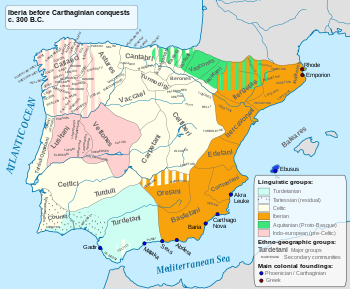Bastetani
votive
feminine figure of the Bastetani

The Bastetani or Bastuli were an
Iberian peninsula (the Roman Hispania). They are believed to have spoken the Iberian language.[1] The relationship between the Iberian Bastetani and the Tartessian Mastieni (who lived in Mastia, on the southeastern coast of the peninsula) is not entirely clear.[2][3]
Their territory
Cádiz), also including Malaka, Abdera, Sexi and Carteia.[3] Their capital was probably the city known as Basti by the Romans, which corresponds to present-day Baza.[3] The Lady of Baza
, a famous Bastetani sculpture, was recovered from the necropolis of Basti in 1971.
See also
- Iberians
- Pre-Roman peoples of the Iberian Peninsula
- Lady of Baza
References
- ISBN 978-1-887829-29-8)
{{citation}}: CS1 maint: numeric names: authors list (link - ISBN 9788400092764.
- ^ a b c Luis A. García Moreno, Mastienos y Bastetanos: un problema de la etnología hispana prerromana. 1990
Bibliography
- Ángel Montenegro et alii, Historia de España 2 - colonizaciones y formación de los pueblos prerromanos (1200-218 a.C), Editorial Gredos, Madrid (1989) ISBN 84-249-1386-8
External links
Wikimedia Commons has media related to Bastetani.
